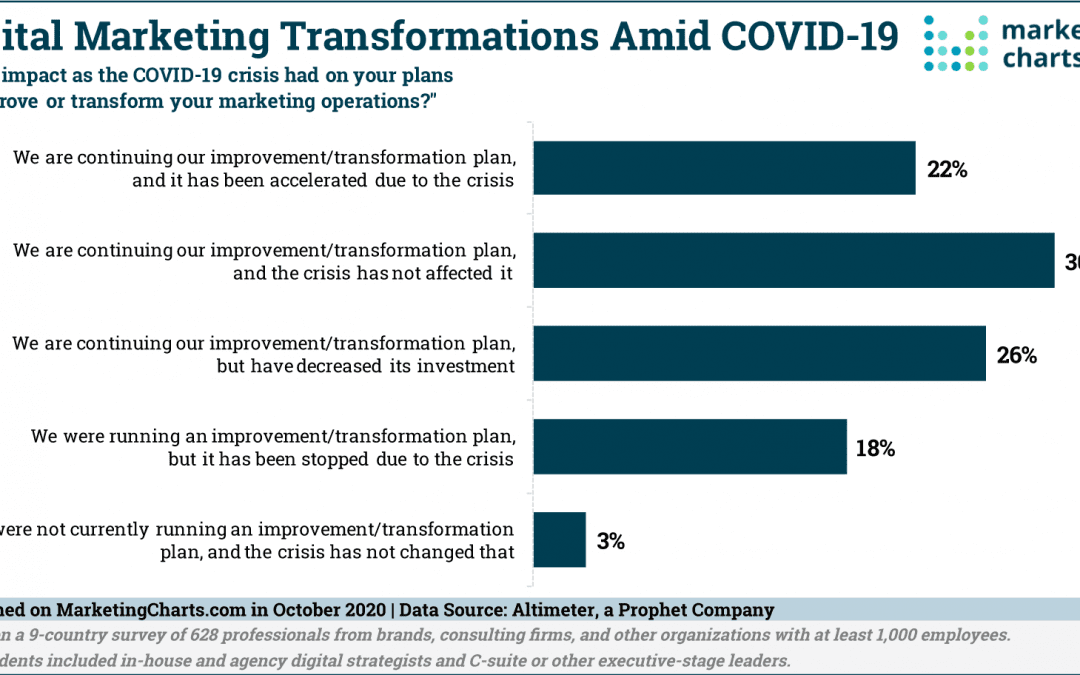It’s undeniable that the COVID-19 Pandemic has had a massive influence on the world. This is specifically prominent in the case of businesses. Pubs and bars across the world have been shut and people have been told to work from home. I already worked from home, so that didn’t change for me. This of course is not taking into consideration the massive differences in personal freedoms, which have been reduced for public safety. Knowing that the pandemic has had such a massive impact on the world, we pose a question. How has the COVID-19 pandemic changed marketing? We’ll be exploring these things and giving you a breakdown of the main changes.
To understand the impacts the COVID-19 pandemic has had on marketing, it’s important for you to understand how it affects the wider business environment. The IMF estimated that the total cost in lost production from the pandemic sat at $28 Trillion. The travel sector has been one of the worst-hit sectors with an 89% decrease in air traffic. This data came from the Office for National Statistics. Additionally, the hospitality sector has suffered significantly. These problems, among others, have led businesses to change the ways that they market to their customers. These changes could have long-lasting implications for the marketing sector as a whole.
The Importance of Marketing Rises During the COVID-19 Pandemic
The COVID-19 pandemic has devastating effects on businesses worldwide. This is part of the reason why marketing is more important now than ever before. What would usually happen in times of economic crisis, is that the marketing team will be among the first to have their budgets slashed. This is supported by the fact that numerous companies were removing the Chief Marketing Officer (CMO) role from their structures. Since then, many of these businesses have reinstated these positions following the pandemic. For example, you have, Natwest and McDonalds among these companies. How has COVID changed marketing? The world is finally understanding the full importance of marketing.

One of the main reasons why the importance of marketing has been recognised is the fact that the pandemic has made it critical for businesses to effectively manage customer relationships. This can be chalked up to the fact that customer retention is key for a business surviving the pandemic. Additionally, the marketing teams in business provide key functions for e-commerce, brand positioning and tracking customer habits. Finally, in the modern-day, businesses can easily face PR disasters. Having an effective marketing team can help with reputation management, which can make the difference for a brand in today’s economy.
The E-Commerce Market Has Undergone Further Growth
Advertising spend has been on the downturn, which shows how COVID has changed marketing. Despite this, there are businesses that are still making use of their advertising budgets to push the development of their e-commerce platforms. The COVID-19 pandemic has made it so that people are no longer shopping physically. At least not as much. This presents the opportunity for growth in the e-commerce market that has been seen throughout the pandemic. Amazon, the undisputed frontrunner of the e-commerce market in the west believes that this trend towards e-commerce will be a permanent one. So, maybe you should think about the e-commerce side of your business?
There is more than just the support of Amazon to back up the aforementioned points. The Global Advertising Trends Report by WARC estimated that companies would spend a collective $59 Billion on e-commerce advertising. Investment in this sense was slated to increase by 18.3%, which represents a growth more than thirty times faster than the general online ads market. If this hasn’t convinced you to get involved with e-commerce, then I don’t know what to tell you. I strongly suggest it as it gives you more opportunity to connect with and sell to your customers. Try it, I’m happy to have a discussion about it with you.
Customer Experience Has Become a Major Marketing Focus During The Pandemic
Customer experience has been at the forefront of the business world for years. I know that because it’s one of the key pillars we embody at Driven Media Solutions. Despite this, the COVID-19 pandemic is definitely accelerating the process and I know that it’s changing the way some businesses operate. For example, two years ago it would have been ridiculous to think that supermarkets and other stores would enforce mask-wearing as mandatory. Alas, to keep customers safe and to comply with government regulations, they have been doing so. It’s not just the supermarkets and shops that are doing this though, I assure you.
Other businesses have been taking serious approaches to health and safety in their customer experience. I can tell you that my team haven’t been taking physical meetings during the pandemic and have focused on Zoom. Hoteliers have also been trying to improve their offering by fully sanitising their rooms and creating a safer environment for customers. This is all in an effort to preserve customer peace of mind. This is also a big deal for companies that aren’t normally associated with this, such as taxis, food delivery and more. Time will tell whether this change is a permanent one, or just to do with circumstance.
COVID Has Changed Marketing For Events
Another big casualty of the COVID-19 pandemic is the event space. Numerous music concerts, conferences and other events have found themselves cancelled due to COVID. Some festival organisers have had to refund tickets for all of their customers and even more have gone bankrupt as a result. This showed that something needed to change and an imperfect solution has been running ever since. This is a virtual event. Of course, if people can’t meet in person, why shouldn’t companies leverage the power of emergent companies like Zoom to help them continue to deliver. This could be the future of events or just a passing trend.

I have already attended a few virtual events now and I find that they’re a decent substitute, especially if COVID means you actually can’t attend. Despite this, I’ve also found that in every virtual event I’ve attended, something has been missing. I’m a social person and I enjoy having a chat with someone in-person, especially if the event is in an area I’m passionate about. Of course, it would be expecting the impossible to think that companies like Zoom could replicate the full event experience. Despite this, there are still a great number of people that are loving digital events in their various forms. It’s definitely better being able to listen to someone live through Zoom than not to hear them at all.
COVID Has Changed Marketing By Helping Companies Making Better Use of Their Budgets
As has previously been explored, companies across the world have seen their revenue hit by the coronavirus pandemic. This has been felt in numerous companies where budget cuts, furlough and actual redundancies have impacted the capabilities of teams in these businesses. COVID has changed marketing by making marketers use their budgets more effectively. Prioritisation among the responsibilities of the media team have become more savage. One of the main ways that marketers have been trying to get the most out of their campaigns is through the use of low-cost, high-impact tools.

This trend looks like it is going to continue in the future. Why do you ask? Well, look at it like this. Do I want to go back to spending more money to get similar results from my marketing team? Of course I don’t. That mentality is also probably going through the head of multiple high-level executives. In the future, marketers are going to place more importance on getting their message out in a way that provides value to their business. Marketers will also be likely to focus on their existing customer base and getting high levels of engagement out of them. I tell you, it’s much easier to sell again to someone who’s already bought from you.
Brands Are Now Being Held To a Higher Level of Social Responsibility
It’s safe to say now that businesses are held to a higher level of responsibility. I look in the newspaper and it seems every week, another company has gotten in trouble for something. Take the recent Burger King marketing campaign on International Women’s Day this year. The campaign sparked controversy as the chain tried to market its educational programmes for women in catering. The unfortunate tagline in this campaign was “women belong in the kitchen”. They explained the fact they weren’t sexist in subsequent tweets, it didn’t win everyone over. This is an example of a well-intentioned campaign ending with controversy. Thankfully, the reputational damage in this instance seemed fairly minimal.
I stay on the side of caution when it comes to sensitive topics. With younger people caring more about racial diversity, gender diversity and the environmental impacts of businesses, brands are having to adapt to this. Even though they should have done so earlier. What we’re already seeing and what we’re likely to see more in future is the work of millennial and Gen Z transforming the concept of corporate social responsibility. This is also being reflected in marketing campaigns from a number of different companies. For example, BrewDog is planting one tree for every unit of beer that they sell.
Conclusion
The Importance of Marketers and The Rise of E-commerce
In this article, we have gone over the ways in which the COVID-19 pandemic has changed marketing. Firstly, we went over the fact that businesses rely on marketers more now. This has led to some companies, which had neglected their marketing functions previously, actually reinvesting back into this area of their business. Additionally, it was identified that e-commerce is growing rapidly during the pandemic. This was supported by the general market beforehand and the pandemic is accelerating this process. The growth in the e-commerce arena is proof of this.
The Trend of Customer Experience and Digital Events
In an effort to save money and make more on existing customers, the idea of customer experience has received a boost. Numerous businesses have changed the way they operate to make them more convenient, safer and more appealing to customers. If you aren’t already focusing on customer experience in your business, you should be. Digital events have also been on the increase as organisers have tried to find new ways to retain their earnings and continue their operations. This might be something that fades rapidly when the pandemic dies, but at the moment, they’re here to stay.
Budgets in Marketing and Corporate Social Responsibility
Due to the pandemic, businesses have been forced to slash their budgets across multiple departments. This has led to marketers needing to be better with their budgets. There is now a focus on trying to get the most possible engagement with the minimum possible expenditure. One of the main driving forces for this has been technology, which has greatly allowed businesses to save time and money in their marketing functions. The rapid emergence of corporate social responsibility and the demand for it amongst the younger generations have also been giving businesses food for thought. The social landscape is rapidly changing and marketers need to be in touch with these changes unless they want to risk a potentially reputation-destroying faux pas.

